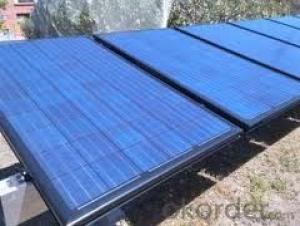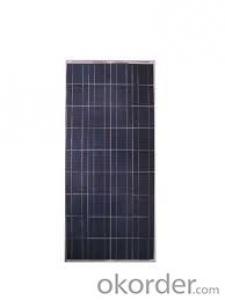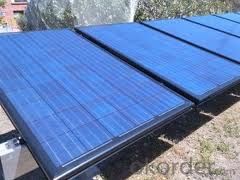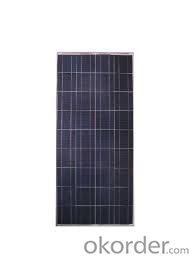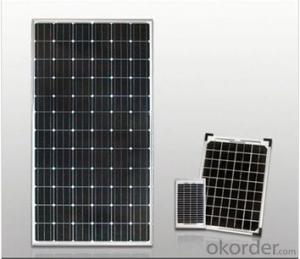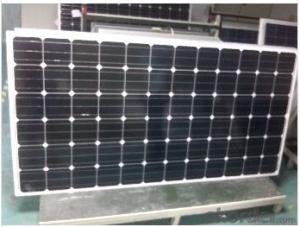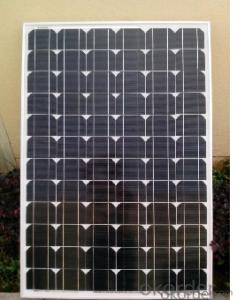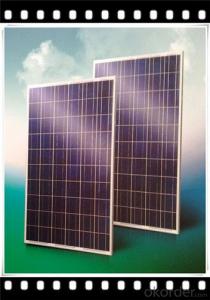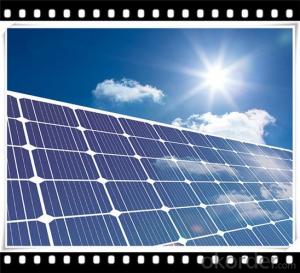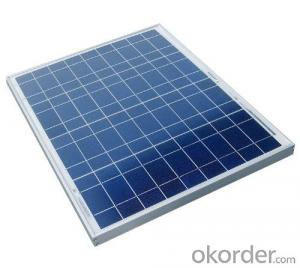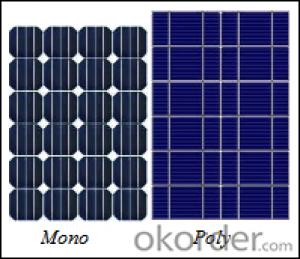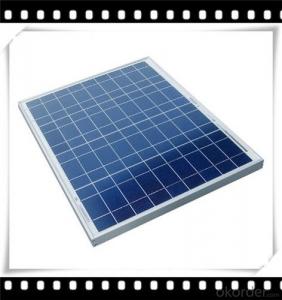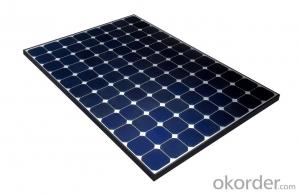75W Pole Mounted Mini Poly Solar Panel CNBM
- Loading Port:
- Qingdao
- Payment Terms:
- TT OR LC
- Min Order Qty:
- 10 set
- Supply Capability:
- 300000 set/month
OKorder Service Pledge
OKorder Financial Service
You Might Also Like
Polycrystalline Solar Modules
CNBM offers a range of small, medium and large polycrystalline solar modules, designed for a range of requirements.
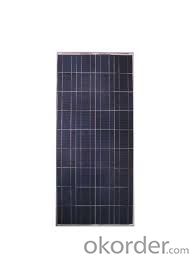
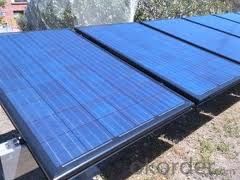
Specifications:
Toleranc | +/-3% |
Cell | Polycrystalline silicon solar cells (156 x 156mm) |
N0. of Cells | 60 (10 x 6) |
Dimension of Modules (mm) | 1650 x 990 x 40 |
Weight (kg) | 25.5 |
Limits:
Operating Temperature | -40~+85? |
Storage Temperature | -40~+85? |
Maximum System Voltage | 1000 VDC max. |
Hail Impact | Diameter of 28mm with impact speed |
Temperature and Coefficients:
NOCT | 48C+/-2? |
Voltage temperature coefficient (%/K) | -0.35 |
Current temperature coefficient (%/K) | 0.05 |
Power temperature coefficient (%/K) | -0.45 |
Characteristics:
Model: | SGM-200P | SGM-210P | SGM-220P |
Max-power voltage Vmp (V) | 29.2 | 29.4 | 29.41 |
Max-power current Imp (A) | 6.85 | 7.14 | 7.48 |
Open-circuit voltage Voc (V) | 36.5 | 36.69 | 36.9 |
Short-Circuit Current Isc (A) | 7.28 | 7.6 | 7.93 |
Max-power Pm(W) | 200 | 210 | 220 |
Model: | SGM-230P |
Max-power voltage Vmp (V) | 29.8 |
Max-power current Imp (A) | 7.72 |
Open-circuit voltage Voc (V) | 37.31 |
Short-Circuit Current Isc (A) | 8.19 |
Max-power Pm(W) | 230 |
STC: Irradiance 1000W/m2, module temperature 25?, AM-=1.5
Poly Crystalline Solar Panels Specifications Range
Maximum Power (Pm) | Dimension | Weight | Operating Voltage (Vmp) | Operating Current (Imp) | Open Circuit Voltage (Voc) | Short Circuit Current (Isc) |
0.45W | 140x80x10mm | 0.08kg | 3.3V | 150mA | 4.6V | 160mA |
1.0W | 162x140x10mm | 0.16kg | 7.5V | 150mA | 10.3V | 160mA |
4.5W | 269x251x23mm | 0.8kg | 16.5V | 0.27A | 20.5V | 0.3A |
10W | 420.1×268.9×22.6mm | 1.92kg | 17.5V | 0.58A | 20.5V | 0.6A |
20W | 425x502x50mm | 3.0kg | 16.8V | 1.19A | 21.0V | 1.29A |
30W | 593x502x22.6mm | 3.9kg | 16.8V | 1.78A | 21.0V | 1.94A |
40W | 655x537x50mm | 5.75kg | 17.3V | 2.31A | 22.1V | 2.54A |
50W | 839x537x50mm | 6.0kg | 17.5V | 2.9A | 21.8V | 3.17A |
65W | 1111x502x50mm | 7.2kg | 17.6V | 3.69A | 22.1V | 3.99A |
80W | 1204x537x50mm | 7.7kg | 17.6V | 4.55A | 22.1V | 4.8A |
- Q: Can solar panels be used for agricultural purposes?
- Yes, solar panels can be used for agricultural purposes. They can provide electricity for various agricultural operations such as irrigation systems, lighting, and powering machinery. Additionally, solar panels can be used to generate clean energy to reduce the carbon footprint of farming practices.
- Q: I have a 20 watt solar panel that I want to set up. I need to connect it to the solar controller but do not know what cable to use. I plan on adding more solar panels down the line. What would be the best cable to use?
- How long is the run? 2 gauge is a good choice for runs up to 25 feet at 20 watts, if you are much further in your run, move to 0 gauge to reduce resistance of the wire itself in the circuit. Otherwise refer to the prevailing electrical code of your local unit government. This is a must if you plan to maintain insurance. At lower voltage, a little resistance means a lot. 4 gauge might be okay for 20 VAC, but the voltage drop on a low voltage system from resistance of the wire itself is measurable at 20 feet. It is the difference between a light fixture working or not. If you are planning on adding additional panels in the future, you can get terminal buss with screw hold downs at various vendors like Mouser or Digi key. Each panel can be on it's own screw, while the buss is common on the other side of the connection. one for the positive and one for the negative.
- Q: Can solar panels be used on a backpack or portable device?
- Yes, solar panels can be used on a backpack or portable device. These panels, often referred to as portable or foldable solar panels, can be easily attached to a backpack or other portable devices to harness sunlight and convert it into usable electricity. This allows you to charge your electronic devices while on the go, making them ideal for outdoor activities, camping trips, or situations where access to a power source is limited.
- Q: Can solar panels be installed in areas with high pollution levels?
- Yes, solar panels can be installed in areas with high pollution levels. While pollution can potentially reduce the efficiency of solar panels, they can still generate electricity even in polluted areas. Regular cleaning and maintenance of the panels can help mitigate the impact of pollution and ensure optimal performance. Additionally, installing solar panels can contribute to reducing pollution by promoting the use of clean and renewable energy sources.
- Q: So I want to power one of my car fans with some solar panels. I ordered quite a few and I want to power one of my fans under the hood. I've already disconnected the fan and pulled it out of the car to test it later.What all do I need besides the panels, fan, and wiring to make this work. This fan will not be tied to any other system. Currently, the fan is not operated by the car or any system of the car due to a modification made to the automobile allowing me to disconnect it from use months ago.Using the fan powered from the solar panels would help with the modification to increase air flow and speed into the area.Could someone please help me by telling me what else I need to make the fan operational from here?
- You may not like it, but the answer's still the same. A car fan will draw anything from a few to several hundred watts, depending on which fan you're talking about (A/C, ventilation, cooling). A solar array will take up roughly one square meter to generate 00 Watts with the sun shining straight down onto it, so you'll need to cover (more or less) the entire roof (or hood) with solar cells in order to power that fan (minimum). If you still want to go ahead: Solar panels, Fuse, cables. Preferrably one cut-out diode per panel (in addition to the hopefully present internal diodes in the panels) in order to prevent one panle dumping its load into the next instead of into the fan. Much better option: get a low power fan (e.g a slow running computer fan) and connect it to that panel of yours. These fans make do with about 0 Watts (at a much lower air throughput), so you'll actually have a chance of running it from the solar panel without coverig your car in panels.
- Q: Can solar panels be damaged by hail or other flying debris?
- Yes, solar panels can be damaged by hail or other flying debris. While they are designed to withstand certain weather conditions, such as wind and rain, hailstorms or large debris impacts can cause physical damage to the panels and reduce their efficiency. It is important to install solar panels in a way that minimizes their exposure to potential hazards and to have insurance coverage for such incidents.
- Q: if i was to put a solar panel (sp) just outside of the earths atmosphere ans another solar panel (sp2) 0km away towards the sun. which one would generate more power (sp or sp2)? and how much more? is there a ratio to work out the power output and distance from the sun? would the 0km distance between the panels make a large difference in power output?many thanks in advance
- there are hundreds of satellites in area with image voltaic panels, yet none of them are designed as ability stations. Transmitting ability employing radio frequencies may be profoundly inefficient. A string of satellites orbiting the Earth may be quite costly. despite if image voltaic ability have been to realize financial viability, we would positioned them on the floor the place shall we use them. Given the quantity of stepped forward renewable components of ability already being developed there is quite no reason to launch a ability plant into area. Wow - watched the youtube video... it quite is conceivable the worst invention ever and that i'm hoping it by no capacity catches on. the final situation we prefer are retards who're too lazy to plug of their telephones dropping electrical energy on rather inefficient on the spot circulate while many aspects of the international are dealing with ability shortages. universal chargers are already undesirable adequate simply by fact they consistently drain electrical energy even while not in use. i'm surely not an environmental saint yet this situation is in basic terms stupid.
- Q: I am looking at building my own solar panels to at least help cut down the rising energy bill. I know its expensive. I already have the solar cells so no need to worry about listing that. But i am looking at wiring it directly into the house. Is there any parts that you could list for me, that would be great. thanks
- You need to talk to your local power utility to see what they require for you to connect your solar power system into the grid.
- Q: what percentage of sunlight is converted into electrical energy in a solar panel?
- Depends on the panel. On the order of 0% perhaps depending on you you measure it. More importantly, what they don't tell you is that more energy is consumed in the mining of necessary materials and the manufacturing process than one of the silly things can produce in a lifetime. Not that there isn't a place for solar panels. It just isn't a smart way to produce energy in large quantities just yet.
- Q: I purchased some small 3.6 v 70mA solar panels online. I have no experience with solar panels. I am confident of the layout of the parallel circuit I want to create, however I don't know how to properly connect the tabs that come from the sides of the panels. Any help on connecting them?
- If okorder
Send your message to us
75W Pole Mounted Mini Poly Solar Panel CNBM
- Loading Port:
- Qingdao
- Payment Terms:
- TT OR LC
- Min Order Qty:
- 10 set
- Supply Capability:
- 300000 set/month
OKorder Service Pledge
OKorder Financial Service
Similar products
Hot products
Hot Searches
Related keywords
